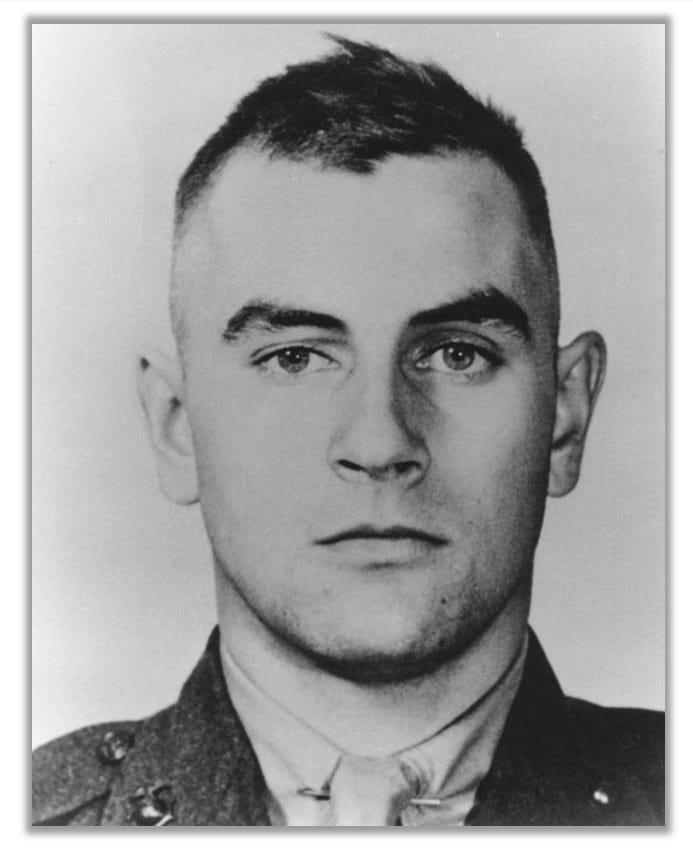TWIH: William Bordelon's Medal of Honor
His actions were vital to the Marines' success in a fierce conflict.
During this Christmas week in 1920, a hero is born in San Antonio, Texas. William “Bill” Bordelon would go on to fight in one of World War II’s most savage Pacific battles, receiving the Medal of Honor for his bravery.
Indeed, his actions proved vital to the Marines’ success in that fierce conflict.
Bordelon had been among those who volunteered to serve after the Japanese attack on Pearl Harbor. His Christmas birthday was mere days away, and his family wanted him to wait until after his birthday to enlist.
He refused. “He told them he had a job to do,” his sister Peggy said, according to Bordelon’s biographer, Douglas Pricer. “He was angry. He wanted to fight. He wanted to join the Marines. Mom and Dad signed the papers so he could go.”
By November 20, 1943, the young staff sergeant was at the fierce Battle of Tarawa, in the Gilbert Islands. Marines were fighting for control of the tiny island of Betio, along the southwest side of the Tarawa Atoll.
It housed an important airstrip.
“Few American battles of this century,” Col. Joseph H. Alexander explains, “featured such savage fighting at sustained point-blank range within such a confined arena. . . . two proud, seasoned, well-armed, ably-led, opposing forces locked in mortal combat on a tiny island from which there would be virtually no escape.”
Many lessons would be learned from the Marines’ amphibious assault that day. A naval bombardment had failed, and the Japanese took advantage: Marines were taking intense fire as they came ashore.
SSgt. Bordelon was at the leading edge of the assault. His LVT was about 40 yards from shore when it was struck and caught fire. Only four men aboard that vessel survived. Bordelon was in a bad situation: He’d been “trained as an elite combat engineer,” Pricer explains, “whose main assignment would be to destroy enemy beachfront fortifications during amphibious assaults,” but now most of his weapons were lost, destroyed in the flaming LVT.
He did have dynamite, though. Bordelon directed two of his men to prepare four charges. Grabbing two, he personally attacked and destroyed the two enemy bunkers closest to him. An attack on a third bunker left him wounded and out of explosives, as one charge had exploded while leaving his hand.
He ignored his injuries, returning to his fellow Marines. He was busy for several minutes after that, grabbing a rifle and providing cover for Marines scaling a seawall before going to the aid of two others in the water. Finally, though, he prepared another charge and attacked a fourth Japanese bunker.
He succeeded in taking it out, but he’d sacrificed himself in the process.
Bordelon died, never knowing the importance of what he’d done: The four bunkers he’d single-handedly destroyed proved to be closest to the west side of a pier. He’d opened up a relatively safe path for the Marines’ amphibious assault to continue. And he’d inspired those around him to persevere.
Bordelon was initially buried on Tarawa, but his body was later moved to the National Memorial Cemetery of the Pacific in Hawaii. Finally, more than 50 years after his death, his siblings succeeded in bringing him home to Texas. He lay in state at the Alamo, a rare privilege, before his final burial.
At ceremonies that day, the Reverend George Montague spoke of the hometown hero who had made San Antonio proud.
“Bill, we’re proud of you for what you did,” he concluded, “proud of what you stood for and proud of what you continue to teach us as we honor the body you gave for your country. We come home today not to bid you farewell but to tell you, ‘Welcome home.’”
Sources can always be found on my website, here.





Terrific story of courage, and I’m glad to read of the final honors of coming home to Texas. Finally, thank you Tara, for your continued efforts to remind us what America and Americans are truly all about.
Such a wonderful example of courage that made a huge difference in a hard fought war. The Marines spirit is amazing and unique. You mentioned the comments of a Col Alexander. I am intimately acquainted with another Marine Colonel of that name. My dad, Colonel Robert B Alexander who served 2 tours in Vietnam and recieved 2 silver stars and a bronze star for courage under fire. He is buried at Arlington. Thank you for your work in bringing to light all the sacrifice that has built this country.